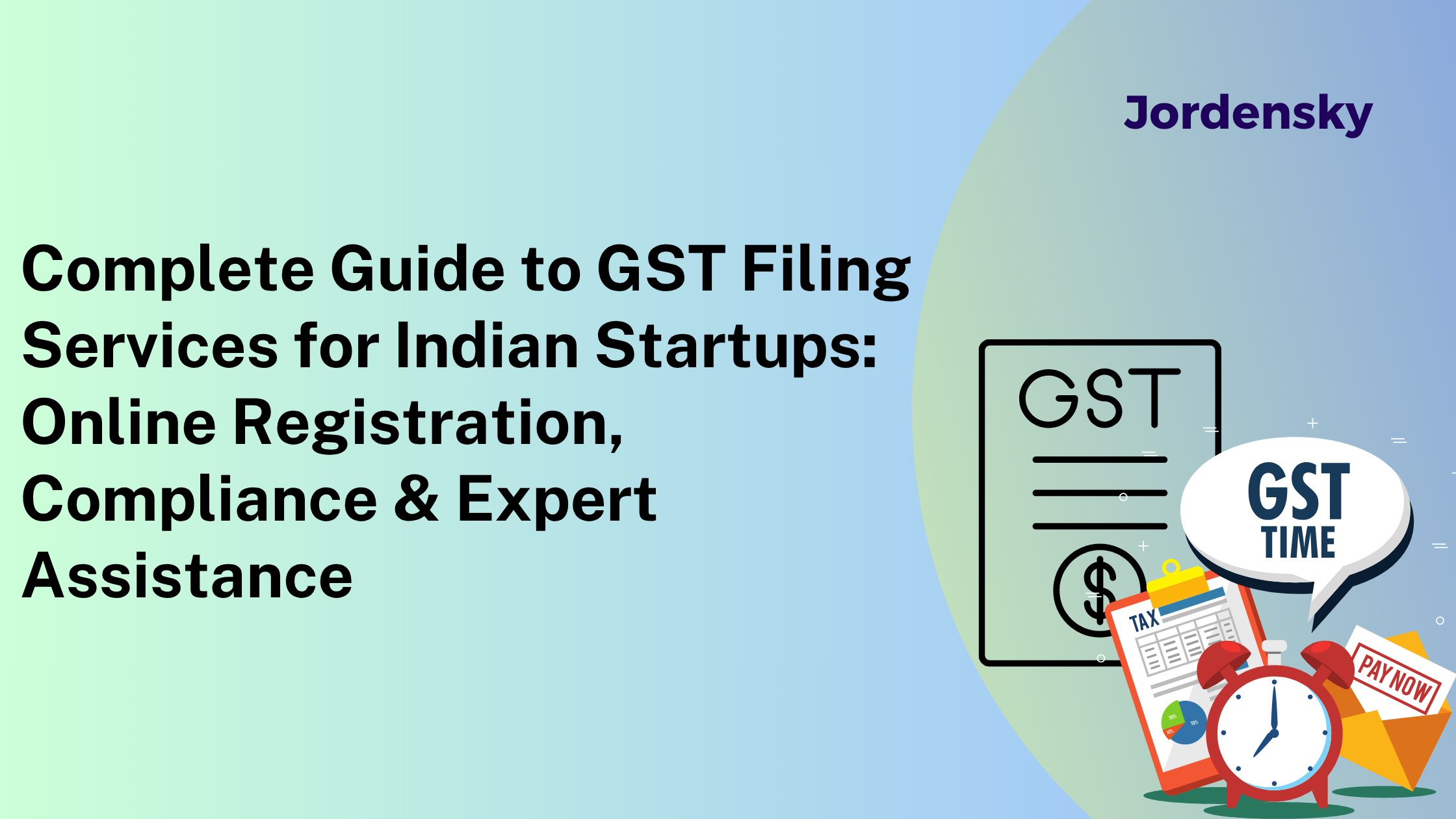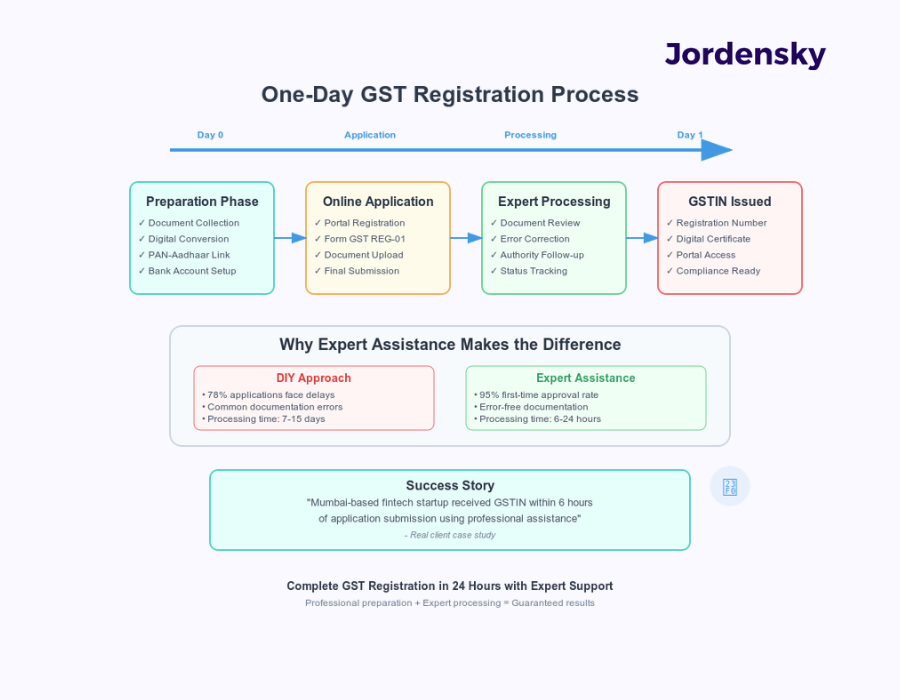Expert GST filing services for Indian startups. Online registration, compliance & plans. Start today!

Starting a business in India is an exciting journey, but navigating the maze of GST compliance can quickly turn that excitement into overwhelming stress. If you're among the 100,000+ startups registered in India last year, you've probably wondered: "How do I handle GST registration without drowning in paperwork?"
Here's a startling reality check: 95% of Indian startups face GST compliance challenges in their first year of operation. The complex regulations, time-consuming paperwork, and the constant fear of penalties can divert your focus from what matters most – growing your business.
But what if you could apply for new GST registration online in a day with expert assistance? What if comprehensive GST filing services could transform this compliance nightmare into a seamless process? That's exactly what we'll explore in this detailed guide, helping you understand everything from registration requirements to choosing the right service provider for your startup's unique needs.
The GST registration landscape for startups isn't as straightforward as many founders assume. While the ₹20 lakh annual turnover threshold (₹10 lakh for northeastern states) is well-known, several scenarios make registration mandatory regardless of turnover:
Take the example of Zomato in its early days – even when their revenue was below the threshold, they needed GST registration because they operated across multiple states. This interstate nature of business is common among Indian startups, making GST registration almost inevitable.
Your startup has several registration options, each with distinct advantages:
Regular GST Registration offers complete input tax credit benefits but requires monthly filing. Most tech startups and service providers opt for this route because of the ITC advantages.
Composition Scheme allows quarterly filing with reduced compliance burden but restricts your ability to claim input credits. This works well for small trading businesses or restaurants with limited interstate transactions.
Companies like Jordensky often recommend regular registration for startups planning rapid growth, as switching from composition to regular scheme later involves additional compliance procedures.
Getting your documentation right from the start can mean the difference between same-day registration approval and weeks of back-and-forth with authorities. Here's what you absolutely need:
Pro tip: According to GSTN data, 78% of registration applications face delays due to incomplete documentation. Having a professional service review your documents before submission can save weeks of processing time.

Before you even touch the GST portal, there's crucial groundwork that determines your success. Smart startups spend 2-3 days preparing rather than rushing into the application process.
Start by digitizing all documents in the correct format – PDFs under 2MB with clear, readable text. Ensure your business bank account is operational and your PAN-Aadhaar linking is verified through the income tax portal.
Here's where many founders stumble: the business premises verification. Your registered address must match across all documents. Jordensky has seen countless applications rejected because the address on the rent agreement didn't exactly match the one on the electricity bill.
The GST portal can be intimidating, but breaking it down into manageable steps makes it surprisingly straightforward:
Step 1: Portal Registration Create your login credentials on the GST portal using your PAN. You'll receive an OTP on your registered mobile number – keep this number accessible throughout the process.
Step 2: Form GST REG-01 Completion This is where attention to detail matters most. The form has 12 parts, but most startups only need to complete parts 1-4 and 11-12. Each field has specific validation rules – for instance, the business description must match your certificate of incorporation exactly.
Step 3: Document Upload Upload documents in the specified sequence. The portal processes uploads sequentially, so uploading the certificate of incorporation before the PAN verification can cause system errors.
Real-world example: A Mumbai-based fintech startup working with Jordensky received their GSTIN within 6 hours of application submission by following this systematic approach. Their secret? Complete document preparation and error-free first submission.
While DIY registration is possible, professional assistance dramatically improves success rates. Expert services offer:
The investment in expert assistance typically pays for itself through time savings and error prevention. Consider this: a founder's time spent wrestling with GST forms could be used for customer acquisition or product development instead.
Monthly GST filing isn't just about submitting forms – it's about maintaining a healthy financial ecosystem for your startup. Comprehensive services typically include:
GSTR-1 Preparation: This outward supply return captures all your sales transactions. For a growing startup, this could mean processing hundreds of invoices monthly. Professional services use automated tools to ensure accuracy and completeness.
GSTR-3B Filing: The summary return that determines your actual tax liability. Errors here directly impact your cash flow. Services like those offered by Jordensky include automated reconciliation between GSTR-1 and GSTR-3B to prevent discrepancies.
Input Tax Credit Optimization: Many startups lose thousands of rupees monthly by not claiming eligible ITC. Professional services maintain detailed purchase registers and ensure maximum legitimate credit claiming.
Annual GST compliance goes beyond monthly filing. It includes:
GSTR-9 Annual Return: A comprehensive summary of your entire year's transactions. For startups with turnover above ₹2 crores, this becomes mandatory and requires careful reconciliation with monthly returns.
GSTR-9C Audit Report: If your turnover exceeds ₹5 crores, you need a chartered accountant's certification. This involves detailed transaction auditing and compliance verification.
Today's comprehensive GST filing services leverage technology to provide superior accuracy and efficiency:
Companies like Jordensky have invested heavily in technology platforms that integrate seamlessly with popular accounting software, reducing manual data entry and associated errors.
Startup founders often focus on the immediate cost of GST services without considering the total cost of ownership. Let's break down the real economics:
Basic Plans (₹2000-4,999/month) typically include:
Standard Plans (₹5,000-9,999/month) add:
Premium Plans (₹10,000+ monthly) include:
Consider this comparison from a Delhi-based e-commerce startup:
In-house compliance costs:
Professional service costs:
Beyond direct costs, professional services eliminate the risk of penalties, which can range from ₹5,000 to ₹25,000 per instance for common violations.
Reputable service providers like Jordensky maintain transparent pricing structures:
For businesses that operated under the service tax regime, transitioning to GST involved specific procedures that many startups still encounter when acquiring older businesses or assets.
The provisional ID mechanism allowed smooth transition of credit balances from service tax to GST. However, many businesses lost eligible credits due to improper transition handling. Professional services ensure that all eligible credits are properly transferred and claimed.
Modern startups often need multiple tax registrations:
Services like Jordensky offer integrated registration processing, handling multiple tax registrations simultaneously to ensure consistency across all applications and reduce processing time.
Professional services maintain comprehensive compliance calendars that track:
This integrated approach ensures that startups never miss critical deadlines and maintain good standing with all tax authorities.
1. Incorrect HSN Code Selection: Using wrong HSN codes can lead to wrong tax rates and compliance issues. A bangalore-based software startup paid an additional ₹2.3 lakhs in taxes due to incorrect HSN classification.
2. Input Tax Credit Claiming Errors: Many startups claim ITC on ineligible expenses like employee welfare or entertainment. This leads to notices and penalty payments.
3. Place of Supply Confusion: For services, determining the correct place of supply affects tax rates and filing requirements. Interstate vs. intrastate classification errors are common.
4. Reverse Charge Mechanism Misunderstanding: When your startup receives services from unregistered providers, you must pay GST under reverse charge. Missing this can result in significant penalties.
5. Invoice Format Non-compliance: GST invoices have specific format requirements. Non-compliant invoices can invalidate ITC claims for your customers.
Modern comprehensive GST services use technology to prevent these common errors:
Companies like Jordensky have invested in AI-powered validation systems that catch potential errors before they become compliance issues.
Successful startups follow these proven practices:
Monthly Reconciliation: Never wait until year-end to reconcile your books. Monthly reconciliation catches discrepancies early when they're easier to resolve.
Automated Integration: Connect your billing system with your GST filing platform to eliminate manual data entry errors.
Regular Training: Ensure your finance team stays updated on GST changes through regular training sessions.
Professional Review: Even with in-house capabilities, quarterly professional reviews can catch issues that internal teams might miss.
When selecting a GST service provider, consider these critical factors:
Professional Qualifications: Ensure the team includes qualified chartered accountants and tax professionals with specific GST expertise.
Technology Platform: The service provider should offer modern, cloud-based platforms with API integrations and real-time reporting capabilities.
Track Record: Look for providers with demonstrated experience serving startups in your industry. Generic tax consultants may not understand startup-specific challenges.
Support Quality: Evaluate response times, communication channels, and escalation procedures. During critical periods like filing deadlines, quick support becomes essential.
Be cautious of providers who:
Navigating GST compliance doesn't have to be a burden that slows down your startup's growth. With the right approach and professional support, you can transform compliance from a time-consuming worry into a streamlined process that supports your business objectives.
The key takeaways for Indian startup founders:
Remember, compliance isn't just about avoiding penalties – it's about building a solid foundation for sustainable growth. Proper GST management enhances your startup's credibility with investors, customers, and partners.
Don't let GST complexity slow down your startup's journey. Jordensky's comprehensive GST filing services are specifically designed for Indian startups, offering expert assistance from registration to ongoing compliance management.
Get started today with Jordensky:
Schedule your free GST consultation today and take the first step toward hassle-free compliance. Let Jordensky handle your GST requirements while you focus on building the next big thing.